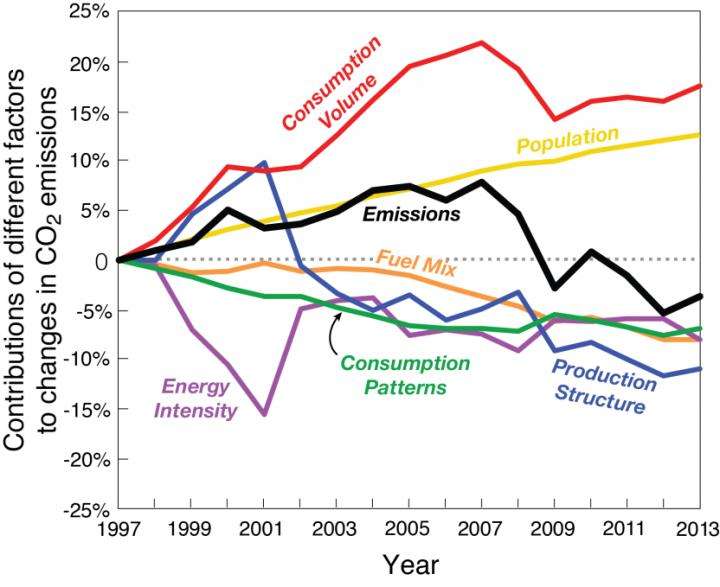Economic slump, not natural gas boom, responsible for drop in CO2 emissions

The 11 percent decrease in climate change-causing carbon dioxide emissions in the U.S. between 2007 and 2013 was caused by the global financial recession - not the reduced use of coal, research from the University of California Irvine, the University of Maryland, and the International Institute for Applied Systems Analysis shows.
Experts have assumed that the drop in emissions reflected a shift toward natural gas, which produces roughly half as much carbon dioxide per unit of energy as coal and was made cheap by the hydraulic fracturing boom. Instead, most of the credit should be given to changing consumer demand and slumping industrial output during the period, according to findings published today in the journal Nature Communications. The results are based on economic analysis of energy use, manufacturing, emissions and consumer demand between 1997 and 2013.
"In our results, natural gas plays a bit part in decreasing emissions," said Steven Davis, assistant professor of Earth system science at UCI and a co-author of the study. "The real heroes are consuming less stuff and using energy more efficiently."
Between 2007 and 2009, when U.S. emissions plummeted by 10 percent, there were changes in how much Americans consumed, what types of products they consumed, the balance of manufacturing and service industries, and the quantity of energy used per dollar of products produced. Together, these changes account for more than three-quarters of the decrease in emissions between 1997 and 2013, with changes in the mix of fuels used to generate energy accounting for just 18 percent, Davis said.
Davis and his co-authors conclude that without new policies that limit CO2 emissions, it may be difficult to keep emissions down as the U.S. economy continues to recover. And in fact, U.S. CO2 emissions rose in 2013 and 2014.
"Lots of people are enthusiastic about the fact that we suddenly have affordable and abundant supplies of natural gas, including many who are concerned about the climate," Davis said. "Our study shows the overriding importance of other factors and warns against wishful thinking."
More information: Nature Communications 6, Article number: 7714 DOI: 10.1038/ncomms8714
Journal information: Nature Communications
Provided by University of California, Irvine
















